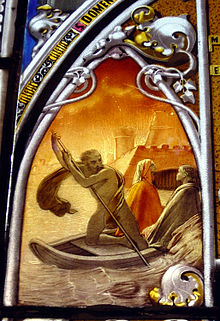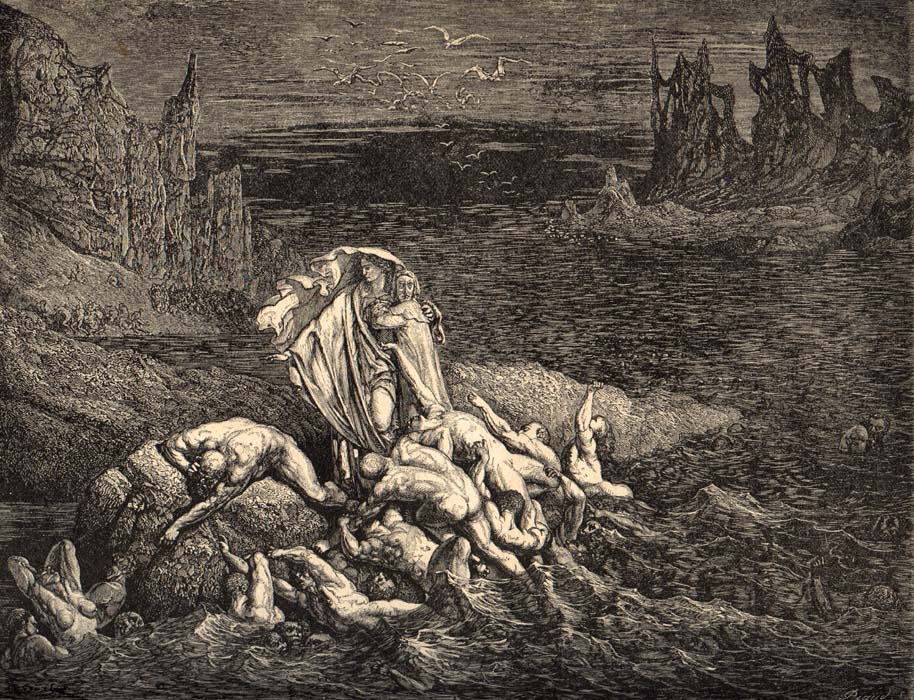My blogging friend Rebecca Budd is currently participating in a #KaramazovReadalong, you can read about it here: https://ontheroadbookclub.com/2021/07/27/karamazovreadalong-day-1-who-is-fyodor/.
The reading group are reading one chapter a day of this book and it inspired me to tackle Divine Comedy by Dante Alighieri in the same manner.
Canto 8
As Dante and Virgil continue around the Fifth Circle of Hell, they come to a tall tower standing on the bank, flames bursting from it’s highest point. Phlegyas, the boatman, meets the two poets but is angered when he realises they are not damned souls. Virgil argues with Phlegyas who agrees to take them across the River Styx.

During the crossing, a soul rises from the slime and confronts Dante. The soul is Filippo Argenti, a Florentine enemy of Dante’s. Argenti is one of the ‘Wrathful” being punished in the marsh. Dante and Argenti have an altercation and Dante reacts badly, wishing Argenti should suffer further punishment. This bitter argument again introduces the theme of politics in this book as Argenti’s family opposed Dante’s return to Florence. It is at this point in the story that Dante’s character starts to change. This is evidenced by Dante’s lack of pity for the Wrathful in the marsh and his angry reaction to Argenti’s behaviour. Interestingly, Virgil praises Dante for his response to Argenti’s comments.

Dante and Virgil continue on to the City of Dis, the capital of Hell where the sins of violence and heresy are punished. The mythological king of the Underworld, Pluto, is sometimes called Dis so this city is named for him.
At the gates of Dis, the damned souls refuse Dante entry and Virgil is unable to convince them otherwise. Virgil assures Dante that “the Great One” is on his way to open the gate.
A quote from Canto 8
And I said: “Teacher, I ’d be greatly pleased
to see him get a ducking in this broth,
before we issue from the marshy lake.”
And he to me: “Thou shalt be satisfied
before the shore reveal itself to thee;
’t is meet that thou enjoy a wish like that.”
Soon after this I saw the muddy people
making such havoc of him, that therefor
I still give praise and render thanks to God.
They all were shouting: “At Filippo Argenti!”
the spirit of the wrathful Florentine
turning, meanwhile, his teeth against himself.
We left him there; of him I therefore tell
no more; but on mine ears there smote a wail,
hence I, intent ahead, unbar mine eyes.
Interesting that the sins of heresy and violence are punished the same. I admit your diligence on this project. Amazing.
LikeLiked by 3 people
Should have been I admire your diligence.
LikeLiked by 1 person
Thank you, I am glad you enjoyed this post. I suppose Dante judged sin on his own scale and the scale of his time. Heresy would have been a most terrible sin at this time, 1300.
LikeLiked by 1 person
You’re really digging into this literature. I wouldn’t be surprised if some allusions to Divine Comedy show up in your next book.
LikeLiked by 2 people
Thank you, Priscilla. I had some allusions to Inferno in my first book, Through the Nethergate. I don’t know if The Soldier and the Radium Girl will lend itself to a connection to Dante. I’ll see as I write.
LikeLike
Hmm, Dante seems quite vengeful in this passage. Praising God for the violence against Argenti??
LikeLiked by 2 people
Yes, exactly, and that is what I was attempting to highlight in my commentary. Virgil also supports Dante’s hard attitude.
LikeLiked by 3 people
I wonder if there were any repercussions from Dante’s eviscerating his enemies in verse.
LikeLiked by 2 people
That I do not know, but I will see if I can find out.
LikeLiked by 1 person
Thank you, Robbie. I would be very interested in what you’re able to find out.
LikeLiked by 2 people
Is vengeance not considered a sin? If not it should be. (K)
LikeLiked by 1 person
Yes, it would be a sin. This Canto is all about that so Dante’s behaviour and attitude are surprising and a change from his previous attitude of great pity.
LikeLiked by 1 person
Obviously there was a lot of discord in this relationship.
LikeLiked by 1 person
Interesting shift in Dante here. And Virgil praising him for it? That raises all kinds of questions. So glad you’re doing this, Robbie. I’m enjoying it very much.
LikeLiked by 2 people
It is very strange, Staci, and I couldn’t really find an answer as to why in the discussion notes I read. The general consensus is that this isn’t one of Dante’s best canto.
LikeLiked by 1 person
Reblogged this on Ed;s Site..
LikeLiked by 1 person
Thank you, Ed.
LikeLiked by 1 person
I was just about to say Virgil must be quite good at negotiating, after he convinces Phlegyas to take them across the river. But it seems like perhaps his luck has run out at the gates of Dis…
LikeLiked by 1 person
It is an interesting situation, Jim. I quite enjoyed this particular canto, but it is generally thought to be among the worst of the cantos with to much going on.
LikeLiked by 1 person
Just wait until we get to the fate of corrupt politicians…
LikeLiked by 1 person
Haha, Chris, that is still coming. Circle 8…
LikeLiked by 1 person
I had to read this book so quickly back in the day (for college). Even so, I still marvel at the things Dante did with it.
Thanks for your take, Robbie. Hugs on the wing!
LikeLiked by 1 person
Hi Teagan, it is pretty amazing how Dante imagined Hell, Purgatory, and Heaven. I am bowled over by his imagination. A bit like yours, actually. Hugs.
LikeLike
Thanks for the outline, Robbie. I’m afraid it’s a bit heavy going for me.
LikeLiked by 1 person
Hi Stevie, this certainly wouldn’t be everyone’s cup of tea, but I am enjoying it very much. The imagery is very vivid and rich.
LikeLiked by 1 person
Another intriguing glimpse, Robbie. I know I will never get around to reading this, so I appreciate your overviews. I always love the artwork and renderings you include as well.
LikeLiked by 1 person
Hi Mae, I am pleased to know that. These posts take a little time to put together so I’m glad you are enjoying them.
LikeLiked by 1 person
I love your insights on this, Robbie. This does sound very vengeful.
LikeLiked by 1 person
HI Denise, it is a lot more vengeful and Dante’s character starts to change in this canto. It’s really interesting.
LikeLike
A great post, as always Robbie. You and Virgil make excellent guides and a dynamic duo.
LikeLiked by 1 person
Thank you, Rebecca. I loved this canto although it is cited as being one of the poorer ones by the experts.
LikeLiked by 1 person
Reblogged this on OPENED HERE >> https:/BOOKS.ESLARN-NET.DE.
LikeLiked by 1 person
Thanks for sharing, Michael.
LikeLike
Thanks for the reminder, Robbie! Have a beautiful weekend! xx Michael
LikeLiked by 1 person
Thank you, Michael. I hope your weekend is also good.
LikeLike
Hi Robbie, I was also surprised at Dante’s change in character, but I do appreciate reading your thoughts. These have been interesting, to say the least. Thanks for taking the time to compile these posts!
LikeLiked by 1 person
HI Lauren, I am glad you find these posts interesting. I enjoy the research and pick up things I missed during my reading of the story. Thanks for visiting.
LikeLiked by 1 person
The door metaphor is excellent for Dante.
LikeLiked by 1 person
Yes, it is. The more I read, the more I admire Dante the poet.
LikeLike
I read the divine comedy a while back whilst at school and never quite appreciated just how marvellous/influential his writing was – think it requires a re-read – thanks for the brilliant post!
LikeLiked by 1 person
It is my pleasure. Thank you for your enthusiasm.
LikeLike